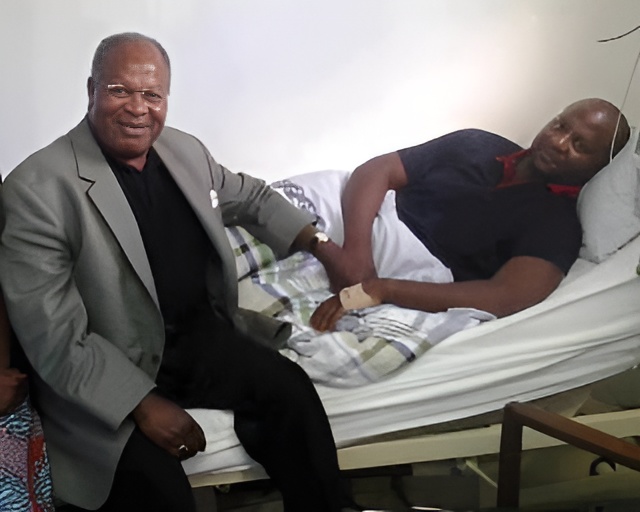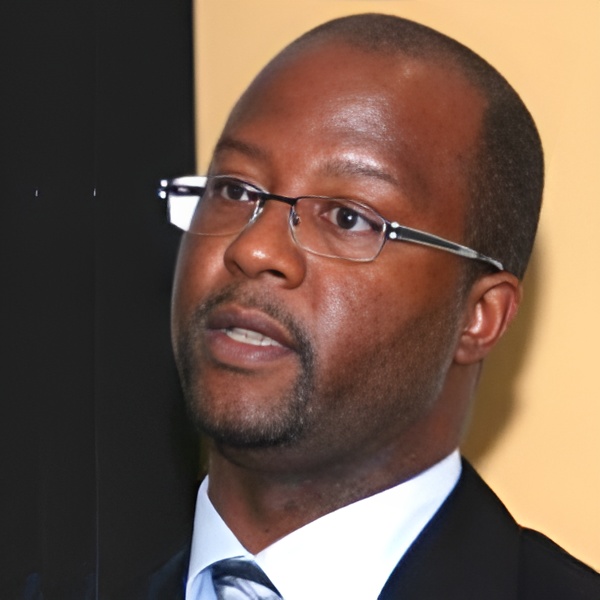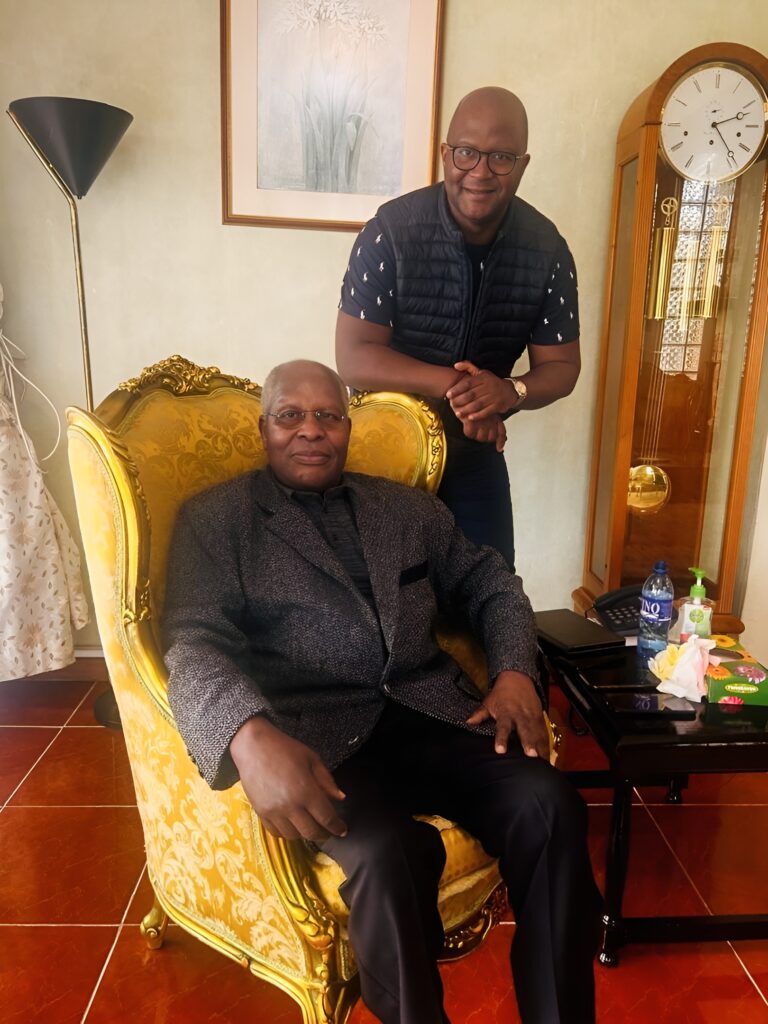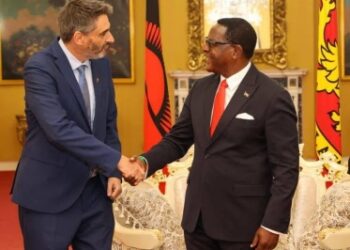A lifetime of privilege. A lifetime of entitlement. Power. Money. Influence. These are not earned badges in Atupele Muluzi’s story — they are inherited ornaments from a dynasty that has done more harm than good to Malawi’s governance and economic foundation.
Atupele Muluzi is the archetypal political heir, a man whose entire career has been tethered to his father, former president Bakili Muluzi. To understand Atupele’s politics, one must first understand his relationship with his father — a relationship marred by manipulation, entitlement, and mutual preservation.

Baby Atupele has never stood on his own political merit. From the start, his identity has been crafted around the shadow of his father. His rise through the ranks of the United Democratic Front (UDF) was not based on ideology, competence, or grassroots appeal. It was pure inheritance. The party that his father founded became a playground for him, and his father’s name became a brand he never stopped riding on.
But what many overlook — or deliberately ignore — is that this relationship has not been one-sided. It is not just Atupele riding on his father’s political legacy; it’s also Bakili Muluzi leveraging his son as a strategic shield. Over the years, Bakili has used Atupele to maintain political relevance and to negotiate with sitting governments in an attempt to protect himself from prosecution.
Despite facing numerous corruption allegations — and having his court cases drag on for decades — Muluzi senior has always found a way to hover close to the corridors of power. And Baby Atu has often been the convenient pawn in this game of survival.
This calculated political dance has meant that Baby Atu, instead of becoming a symbol of reform or youth-driven leadership, has merely been a vessel for an older generation’s sins. His loyalty has not been to the people of Malawi, but to the family brand — to the dynasty.

It is therefore astonishing, if not insulting, to see Baby Atu now positioning himself as a voice of reason in national economic discourse, especially following his recent criticisms of the current government over the termination of the IMF Extended Credit Facility (ECF). The question is: what moral authority does Atupele Muluzi have to speak on economic mismanagement when the Muluzi name is synonymous with the economic erosion that Malawi still suffers from today?
It was under his father’s leadership that Malawi began its disastrous journey of reckless privatisation. State-owned enterprises — which were the backbone of local employment and industrial productivity — were stripped and sold for peanuts.
During President Bakili Muluzi’s tenure (1994–2004), Malawi underwent a significant wave of privatizations of iconic state-owned enterprises (SOEs) which often led to diminished services, job losses, and economic challenges.
Some of these companies were the backbone of the country’s economy and among them included the Malawi Railways which operated a national railway system, facilitating both freight and passenger transport and the Shire Bus Lines (formerly United Transport Malawi and later Stagecoach Limited) which provided essential public transportation services. These companies were privatized out of greed to save personal transportation and haulage businesses.
Then other conglomerates were sold for a song to personal friends and cronies as well as those with political connections.
Among them include the Malawi Dairy Industries (MDI); Tambala Foods and its sister company Mulanje Caning Factory; Malawi Telecommunications Limited (MTL); Brown and Clapperton (B&C); Press Corporation Limited (PCL) which underwent restructuring and partial privatization in the late 1990s; the Plumbing and Engineering Works (PEW), once a leading engineering firm even beyond Malawi; David Whitehead and Sons, a major textile manufacturer; Grain and Milling Company; Cold Storage Company; Import and Export Limited; and Malawi Development Corporation (MDC).
The Muluzi administration prioritized short-term political gains over sustainable development, opening the floodgates for cheap imports that destroyed local industries. Malawi’s self-reliance was sacrificed on the altar of misguided liberalisation.
Even worse, the Muluzi government institutionalised corruption. It turned public service into a feeding trough, breeding a culture of impunity that successive administrations have failed to root out. It is the same rot we still grapple with today — and much of it traces back to that foundational decay under Bakili Muluzi.

For Baby Atu, whose political DNA is embedded in that legacy, to now stand atop a soapbox preaching economic morality is the height of hypocrisy. He is not an outsider with a fresh perspective; he is a direct descendant of the rot. His criticisms — no matter how factually accurate they may sometimes be — are rendered hollow by the very foundation on which his own privilege and political relevance were built.
Even the people saw through the charade. In the 2019 parliamentary elections, Baby Atu was rejected — losing embarrassingly in his own constituency to a little known Ajilu Richard Kalitendere, a political newcomer.
This loss in his constituency was stinging rebuke, not just of Baby Atu as a candidate, but of the entitled politics he represents. Voters preferred a grassroots voice to the carefully packaged entitlement of a political prince. And yet, despite that rejection, Baby Atu continues to position himself as Malawi’s saviour, peddling political commentary as if he’s a neutral technocrat rather than a dynastic beneficiary.
Baby Atu’s supporters often claim he’s his own man. But time and again, he has proven otherwise. He has failed to draw a clear ideological line between himself and his father’s political legacy. When faced with opportunities to confront or condemn past policy failures, Baby Atu has chosen silence. When given the platform to propose new, radical ideas, he has chosen regurgitation of political platitudes. And when it has mattered most, he has aligned himself with convenience over conviction.
To put it plainly: Atupele Muluzi is not the answer to Malawi’s problems. He is a product of those problems. A manufactured brand. A puppet masquerading as a reformer. Until he genuinely confronts and distances himself from the misdeeds of the Muluzi era, and stops being a mouthpiece for his father’s interests — he cannot speak with moral authority about governance, reform, or economic recovery.
Malawi needs honest leadership — not recycled dynasties. It needs visionaries, not opportunists. Baby Atu’s attempt to recast himself as a voice of accountability falls flat against the backdrop of a past he continues to benefit from but refuses to reckon with.
Until then, Baby Atu should do Malawi a favor: either grow a spine and stand as his own man or step aside and let real leaders rise.







